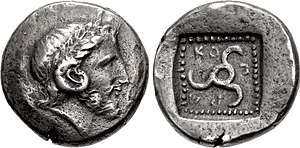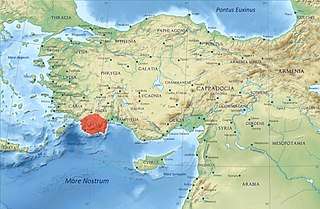Kuprilli
Kuprilli (Lycian: KOΠPΛΛE, circa 480-440 BC) was a dynast of Lycia, at a time when this part of Anatolia was subject to the Persian, or Achaemenid, Empire.[1] Kuprilli ruled at the time of the Athenian alliance, the Delian League.
Kuprilli | |
|---|---|
 | |
| Allegiance | Achaemenid Empire |
| Years of service | fl. 480 – 440 BC |
| Rank | Dynast of Lycia |

Present-day knowledge of Lycia in the period of classical antiquity comes mostly from archaeology, in which this region is unusually rich.[2] There is evidence of a fire that destroyed the wooden tombs and temples of Xanthos in around 470 BC. This fire was probably caused by Cimon of Athens when he attacked the sacred citadel in retaliation for the destruction of the Athenian Acropolis by the Persians and their allies, including the Lycians, in 480 BC.[3] The Xanthians, under their dynast, Kuprilli, rebuilt the buildings in stone, which are reflected in the numerous Tombs of Xanthos visible today.[4]
Coinage
 Coinage of Kuprilli. Circa 470-440 BC.[5]
Coinage of Kuprilli. Circa 470-440 BC.[5] Coinage of Kuprilli c. 470-440 BC
Coinage of Kuprilli c. 470-440 BC
Notes
- Morkholm, O. et Zahle, J. 1972, « The Coinage of Kuprilli. Numismatic and Archaeological Study », AcArtf : 57-113
- D. T. Potts, A Companion to the Archaeology of the Ancient Near East (2012), p. 912: "...c. 380–370 BC, two western Lycian dynasts named Arttumpara and Mithrapata claimed power simultaneously."
- Jenkins 2006, p. 155
- Jenkins 2006, p. 23
- CNG: DYNASTS of LYCIA. Kuprilli. Circa 470/60-440/35 BC. AR Tetrobol (19mm, 3.05 g, 10h).
Sources
- Jenkins, Ian (2006), Greek architecture and its sculpture, Harvard University Press, ISBN 978-0-674-02388-8